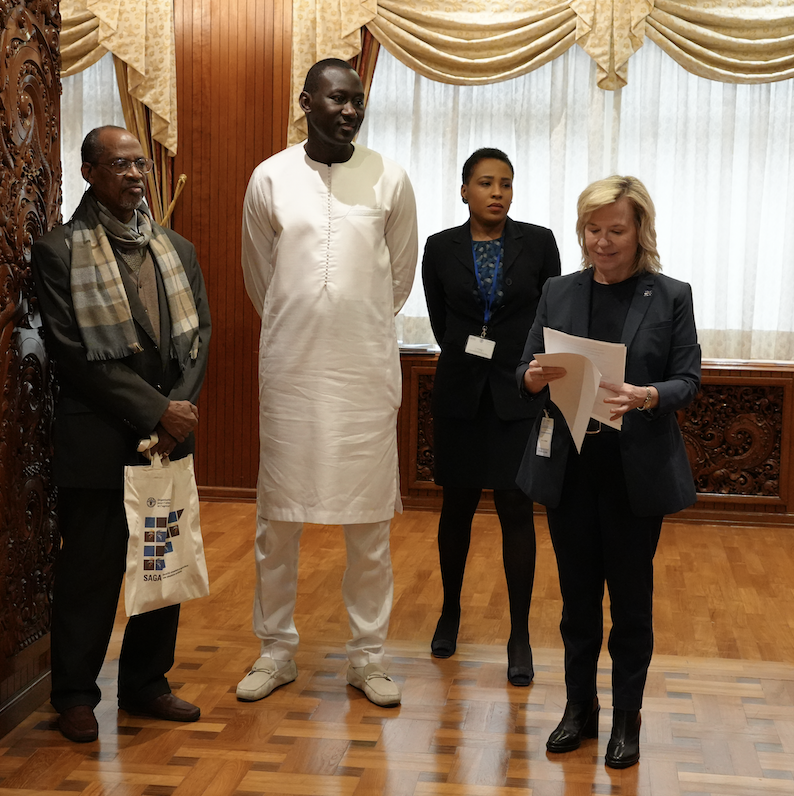FAO and Quebec strengthen commitment to climate adaptation in Côte d’Ivoire, Haiti and Senegal

Rome, 29 February 2024 - Côte d’Ivoire, Haiti and Senegal are particularly vulnerable given their coastal exposure and reliance on natural resources. Recurring drought, irregular rainfall patterns and rising temperatures threaten agriculture, food security and livelihoods. Agriculture and food systems face serious risk if urgent measures to tackle climate change and biodiversity loss are not taken.
In this context of increased environmental vulnerability, the Food and Agriculture Organization of the United Nations (FAO) officially launched the second phase of the "Food security and agriculture: accelerating adaptation” (SAGA 2) project on February 23. The event brought together FAO’s Deputy Director-General, Maria Helena Semedo and Quebec's Minister of International Relations and Francophonie, Martine Biron at FAO’s headquarters in Rome.
“I am very happy to see that collaboration between the Government of Quebec and FAO in the field of agriculture, climate and biodiversity continues to get stronger”, said Maria Helena Semedo who joined Quebec's Minister of International Relations and Francophonie, Martine Biron and ambassadors and representative from the three countries at FAO’s headquarters in Rome.
Strengthened collaboration
The SAGA 2 project builds on successes from the pilot phase (2018-2023) bringing together researchers, government officials and civil society to work on effective policies, improve farmers’ capacities and develop science-based data to combat climate change in Côte d’Ivoire, Haiti and Senegal.
In line with its initial commitment, the Government of Quebec contributed an additional $5 million dollars to the second phase, demonstrating its dedication to the global fight against climate change and its impacts.
“We have learned many lessons from the first phase of SAGA in Haiti and Senegal which can strengthen the second phase of the project. SAGA 2 will allow us to go further, by expanding our work to Côte d’Ivoire”, said Martine Biron, Quebec’s Minister of International Relations.


Building on achievements
The pilot phase of the SAGA project yielded remarkable results in Haiti and Senegal where it informed national planning processes, providing essential support to the adaptation component of the countries’ Nationally Determined Contributions (NDCs) and the integration of agriculture in the National Adaptation Plans (NAPs) process. In addition, the project played a crucial role in the development of an adaptation action plan in Senegal (Kolda, Louga and Thiès regions), and an adaptation planning guide in Haiti.
On the ground, SAGA has implemented a broad range of initiatives and trained more than 2 000 small-scale food producers, engaging them in activities ranging from market gardening to animal husbandry, agroforestry and much more. These small-scale food producers are equipped with the knowledge and skills to share these experiences within and beyond their communities.
One of the key components of the SAGA project lies in the integration of gender in capacity building. The participatory methods implemented strengthen the capacities of producers to face the interconnected climate and biodiversity crises while bolstering the skills of women who are more vulnerable to the effects of climate change.
“On my field visit to Senegal in January 2023, I saw women in control who had achieved financial independence while facing the challenges of climate change thanks to the SAGA project,” said Martine Biron, who is also Quebec’s Minister responsible for the status of women.
SAGA was awarded the International Outreach Award by the Prix d’excellence de l’administration publique of Quebec at the end of 2023 which recognized the project’s innovative multi-actor, multi-sector and multi-scale approach - and its strong partnerships between governments, universities, research institutes and civil society organizations.
SAGA 2: Scaling up
After laying the groundwork in the first phase, SAGA 2 will continue to support communities in the local implementation of national adaptation strategies for agriculture, with a focus on scaling up methods that have already proven successful at the community level. The project is also focusing on strengthening research to better support the adaptation work of institutions in the agriculture sectors, while seeking to increase the number of francophone tools to promote the broader and more effective use of knowledge.
Through its comprehensive approach and strong partnerships, SAGA 2 stands as a pillar of sustainable agricultural adaptation, offering concrete solutions that answer to the Paris Agreement and drive collective climate action towards ensuring food security in West Africa and beyond.
More on this topic
Strengthening Agricultural Adaptation (SAGA)
